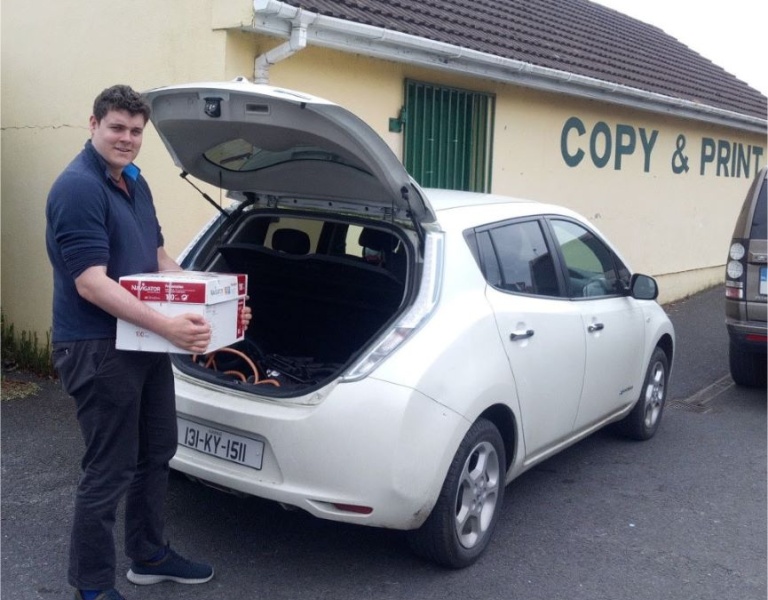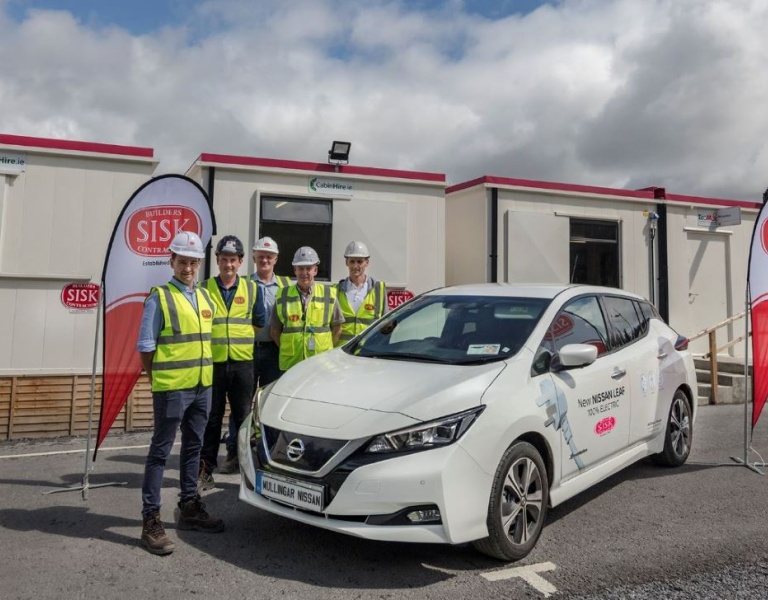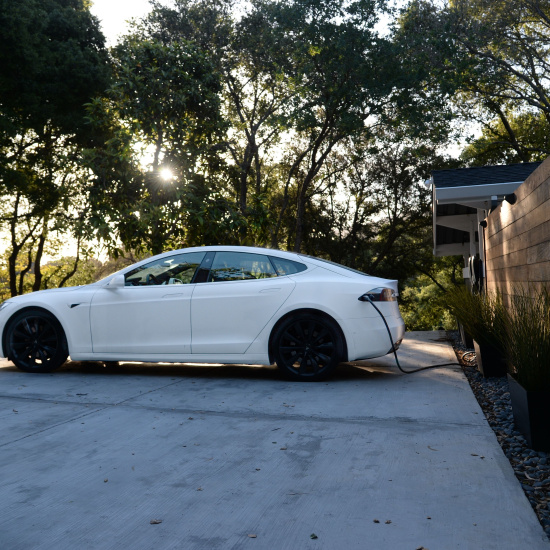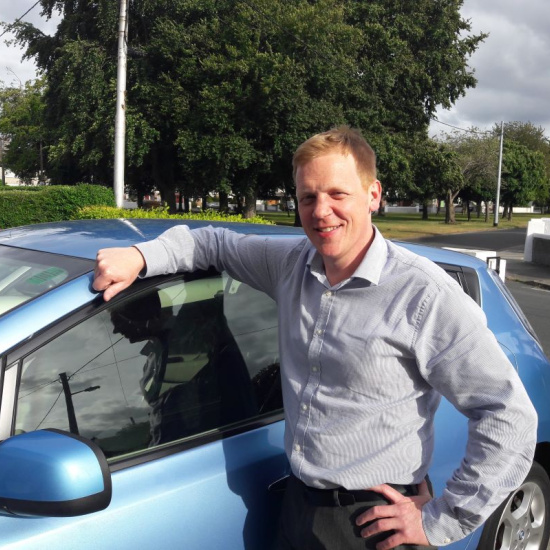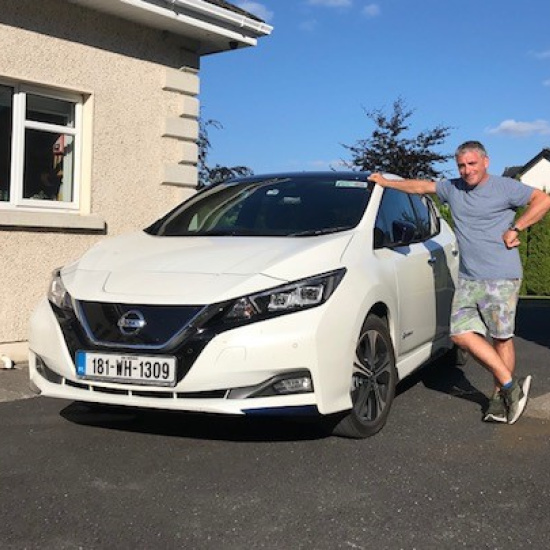Reviews of Electric Cars for Business
The rising number of commercial EVs on the road coincides with the introduction of the 0% BIK for fully electric vehicles.
EV for Business
The number of EVs for business is currently split 40% commercial and 60% private. The high number of commercial vehicles on the road coincides with the introduction of the 0% BIK for fully electric vehicles.
Chris Drumm is the owner of a family-run digital print and design business, Copywrite in Tralee, Co. Kerry. They have six full-time employees. "Our design and print business is on the outskirts of Tralee. We always needed to travel to collect stock, make deliveries, meet clients and go to the recycling centre," says Chris.
"We had a 2006 van which was in need of replacement. We felt that 75% of the driving could be done using a car."
In 2015, the company purchased a second-hand Nissan Leaf with about 10,000km on the clock. The EV soon became the vehicle of choice for all staff. Chris comments that on sales trips, conversations with clients would always involve a discussion about the car. With the first EV going well they decided to introduce an electric Renault Zoe 40Kw into the business in 2018.
This biggest benefit for Chris was the change in the 'Benefit in Kind' rules. This is where tax exemptions are given to employees using an electric car. He says the new rules means that the "crazy paperwork and keeping daily records reduced considerably".
Savings
Chris spent approximately €1500 per year on diesel with his van. His diesel bill reduced to around €500 when he introduced the first EV. It went down to €300 with the introduction of the second EV.
"The main saving has been servicing. The diesel van was costing about €1000 per year on general maintenance and servicing," he adds.
"This has now reduced to about €500 for all three vehicles which is a fantastic saving for us."
Although Chris can't see himself moving back to oil, he will keep the diesel van. He will use it as little possible until a viable alternative can be found. With regard to the negatives, Chris says: "The range is an issue no matter how you look at it. Reduced range means lower productivity during the working day. It has been an issue for us without doubt."
However, he notes that with the new Renault Zoe their situation has improved considerably. Even with that drawback, Chris continues: "I have driven trucks, buses, vans and taxis throughout Europe. I love working with engines. I think we should recognise that the big-oil era is over. A fuel source that can be delivered to any house in the country using existing technology will win out."
"I think we should recognise that the big-oil era is over, a fuel source that can be delivered to any house in the country using existing technology is going to win out"
Larger companies are also making the move to EVs
John Sisk & Son Ltd is an international engineering and construction company. In 2018, Sisk decided to lease four electric vehicles. They had identified that their car fleet fuel was one of company's most significant energy users.
Ian O'Connor, Energy Manager at SISK said: "The feedback from staff has been one of surprise. Surprised about how well the electric cars perform particularly from those with no experience of electric vehicles. "Since the cars have been here, the profile of EVs has risen exponentially. This has led to a significant increase in queries."
Sisk have installed four fast-charging points at their Head Office in Dublin. They are in the process of providing these facilities to all of their offices.
When it comes to the benefits, Ian adds: "BIK is the single biggest factor for employees. Some are proactive when it comes to energy efficiency. They are happy to play their part while some are innovators who like innovative technology."
"Given the small number of electric cars in our fleet relative to the total number, the savings have been small.
The biggest benefit of introducing electric cars to our fleet has been the increased awareness levels among staff. Getting the conversation started that electric cars are here and employees can use them. this demonstrates that electric vehicles are a real alternative to diesel cars."
Advice to other businesses
Chris believes that having an EV in your business is the way forward. "There are more and more long range EV options out there. Stop thinking about it, just go for it. It says a lot about your business when you show up in an eco-friendly vehicle," he says.
Ian, on the other hand, advises to examine the driving profiles of employees. "While annual mileage might be high, the range of daily trips could be well within the range of electric vehicles."
He also highlights the importance of providing charging facilities at work. "If employees have to spend working time at a garage charging, the business case will go out the window."
Sales of Electric Cars
There are currently 10,000 electric vehicles on the road in Ireland. The National Framework on alternative fuels forecasts a total of 20,000 passenger EVs on our roads by the end of 2020. Sales of new EVs doubled in 2018 from the previous year and we predict sales will triple in 2019.
Meanwhile, Ireland's Climate Action Plan 2019 envisages that up to 840,000 passenger EVs will be on our roads by 2030.
ESB E-cars have been awarded €10m to develop fast-charging super hubs between our major urban areas. While Ionity, Tesla, Lidl, An Post and EasyGo are also introducing their own charging networks.


